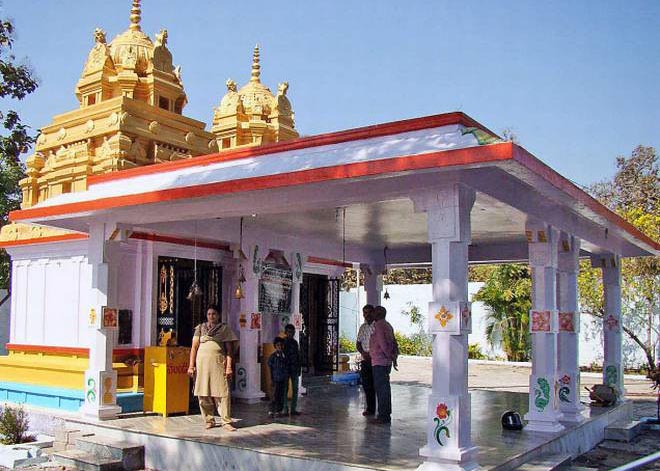Keslapur Nagoba Temple

Information of Keslapur Nagoba Temple, Adilabad, Telangana
Nagoba temple is located in the village named Keslapur, in the district of Adilabad, in the state of Telangana, in South India. It is approximately 32kms from the town of Adilabad and about 25kms from Uttnoor Taluk. It is the most famous temple dedicated to the Serpent God popularly called as "Shesha Nag", the divine serpent of Lord Shiva. This particular deity is largely offered various types of religious pujas throughout the year with much devotion and reverence not only from the adherent devotees within the state of Telangana but also from the neighboring states of Andhra Pradesh, Maharashtra, Karnataka and Chhattisgarh.
Keslapur Nagoba Temple Religious Significance
Nagoba temple is known for various types of poojas, yagnas, homams and other religious rituals performed to the Lord. They are Sheshavahana Bhandi Utsava in the Angana, Panchamrutha Mahabhisheka, Mahapooja with Palanquin Utsava, Palanquin Utsava with Deeparadhane, Sankshiptha Seva, Mahapooja, Panchamrutha Abhishekam with Pavamana, Panchamrutha Abhishekam, Panchamrutha Abhishekam with Kalashapooja, Rudrabhishekam, Sheshaseva including Astottaram, Kshirabhishekam, Karthika Pooja, Harivana Naivedyam, Panchakajjaya, Chithranna, Sahasranamarchana, Milk Payasam (Halu Payasa), Palanquin Utsava with Night Mahapooja, Astottara Archana, Nandadeepa (one Month), Mristanna Santharpane and Dolostava. This temple is mostly visited by devotees who doesn't have children, bachelors and sinister who looking forward for early marriage, married couple's with personal issues and old age people who are suffering with various types of serious ailments. At this particular temple, devotees wholeheartedly indulge in shearing child's hair, Pierching ear lobs, Sarpasamskara with Nagaprathista, Thulabhara, Nagaprathista, Annaprashana, Ashlesha Bali, Shastivratha Udyapana and Ashlesha Bali Udyapana. It is strongly believed that Sathyanarayana Pooja, Moola Prasadam offerings, Rangapooja with Deeparadhana, Karthika Pooja, Karthika Pooja with Deepradhana, Alankara Poja, Mangalarathi, Fruit-Ghee Samarpana, offering of Silver or Gold images etc will help in removing various types of evil effects and helps to lead a happy and prosperous personal and professional life. The Maharashtra's Gondu tribes visit this temple every year by walk from their home to this temple with their family members, relatives and close friends. It is strongly believed that difficulties will be immediately resolved if prayed to this Lord with much devotion and commitment.
Keslapur Nagoba Temple Architectural Significance
Nagoba temple is built based on the South Indian Hindu temple architectural styles and patterns with a lot of perfection. It is an ancient Hindu temple in this region which is much popular for its unique temple structure in all the aspects. According to the local legends and religious experts, this particular temple was built in a successful manner in those days as per the Vasthusastra of the region and its spot. The temple structure looks very small like a village temple but its popularity can't be measured under any parameters. It looks like a rock carved temple. The interior and exterior of this shrine is filled with images of snakes and tales related to this particular Lord. There are no sub-temples in the temple complex. The gopuram or tower of the main temple is very small in size when compared to other temples of this region.
Festivals at Keslapur Nagoba Temple
Nagoba temple is popularly known for conducting major festivals like Maha Shivaraathri, Shri Krishna Janmashtami, Ekadashi days, Ashlesha Nakshathra and Shuddha Shashti in a religious manner. During the months of December and January that is per the Telugu regional calendar in the month of Pushyam or PushyaMasam, this particular deity is offered many different types of offerings plus wholeheartedly rendered special pujas with much dedication and commitment. According to the local legends, the whole said month is largely termed as auspicious and celebrated throughout with active participation of local people and devotees from the rest of the state.
- Andhra Pradesh Temples
- Assam Temples
- Bihar Temples
- New Delhi Temples
- Goa Temples
- Gujarat Temples
- Jammu and Kashmir Temples
- Karnataka Temples
- Kerala Temples
- Madhya Pradesh Temples
- Maharashtra Temples
- Odisha Temples
- Punjab Temples
- Rajasthan Temples
- Sikkim Temples
- Tamil Nadu Temples
- Telangana Temples
- Uttar Pradesh Temples
- Uttarakhand Temples
- West Bengal Temples